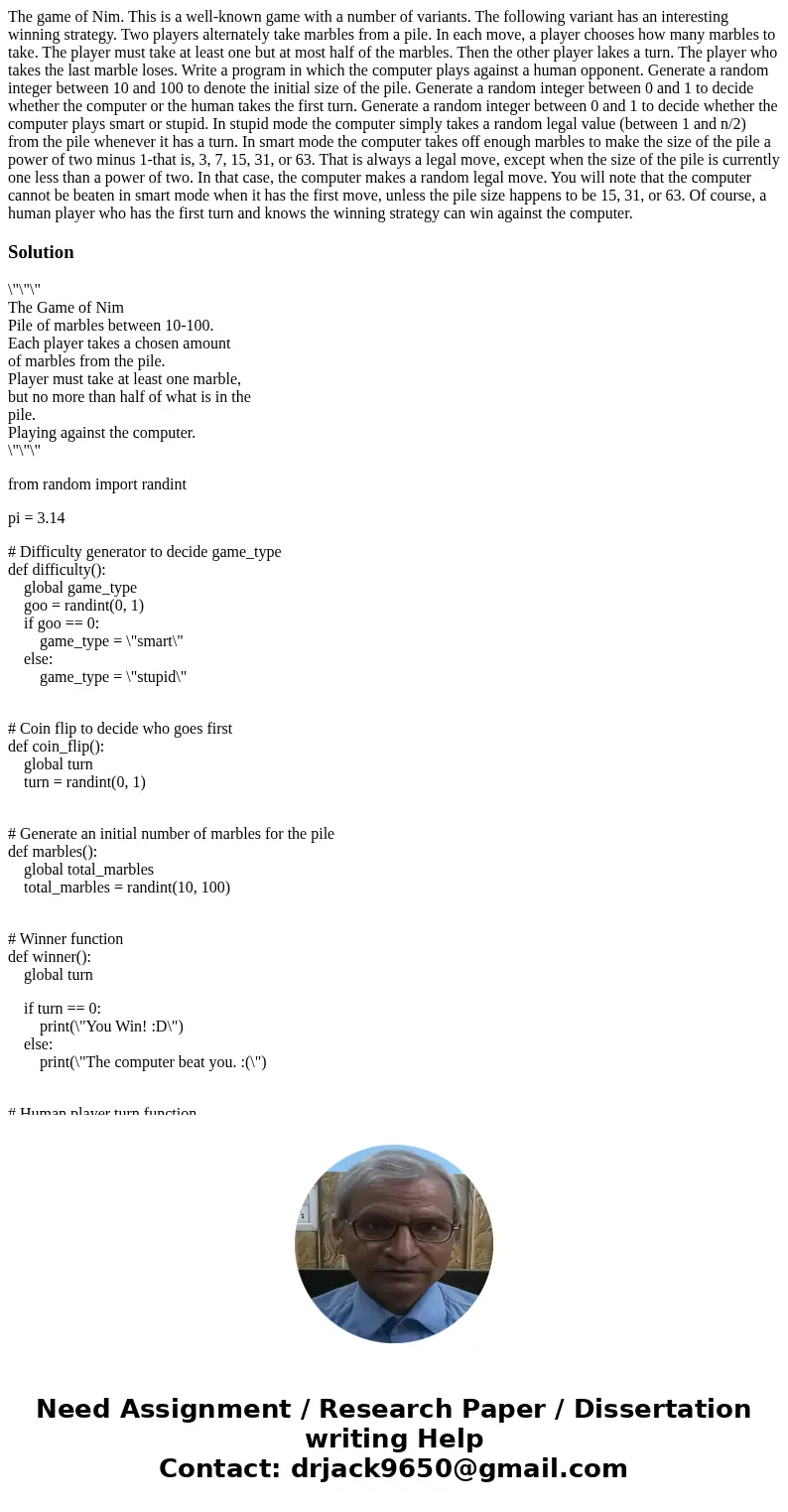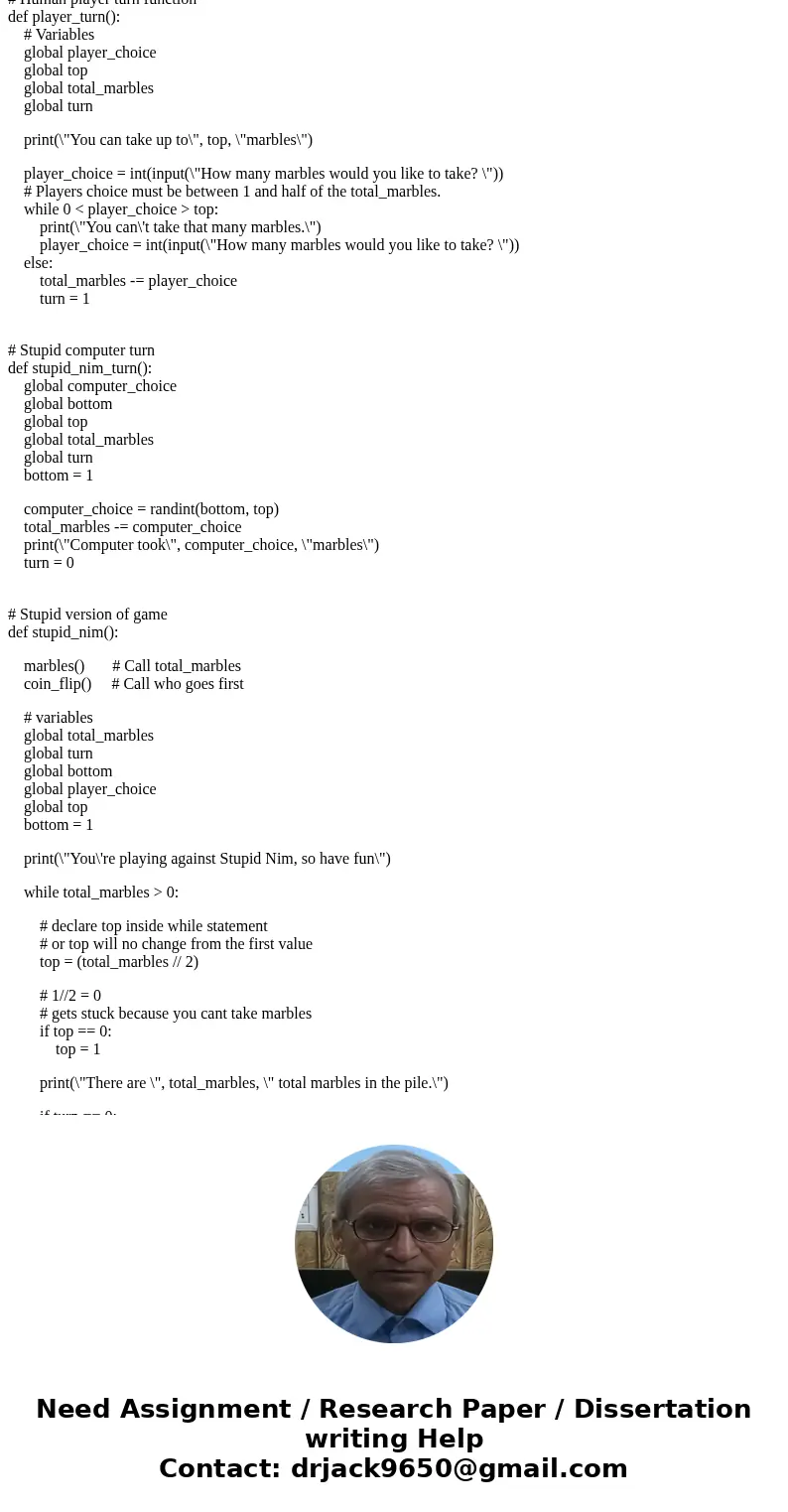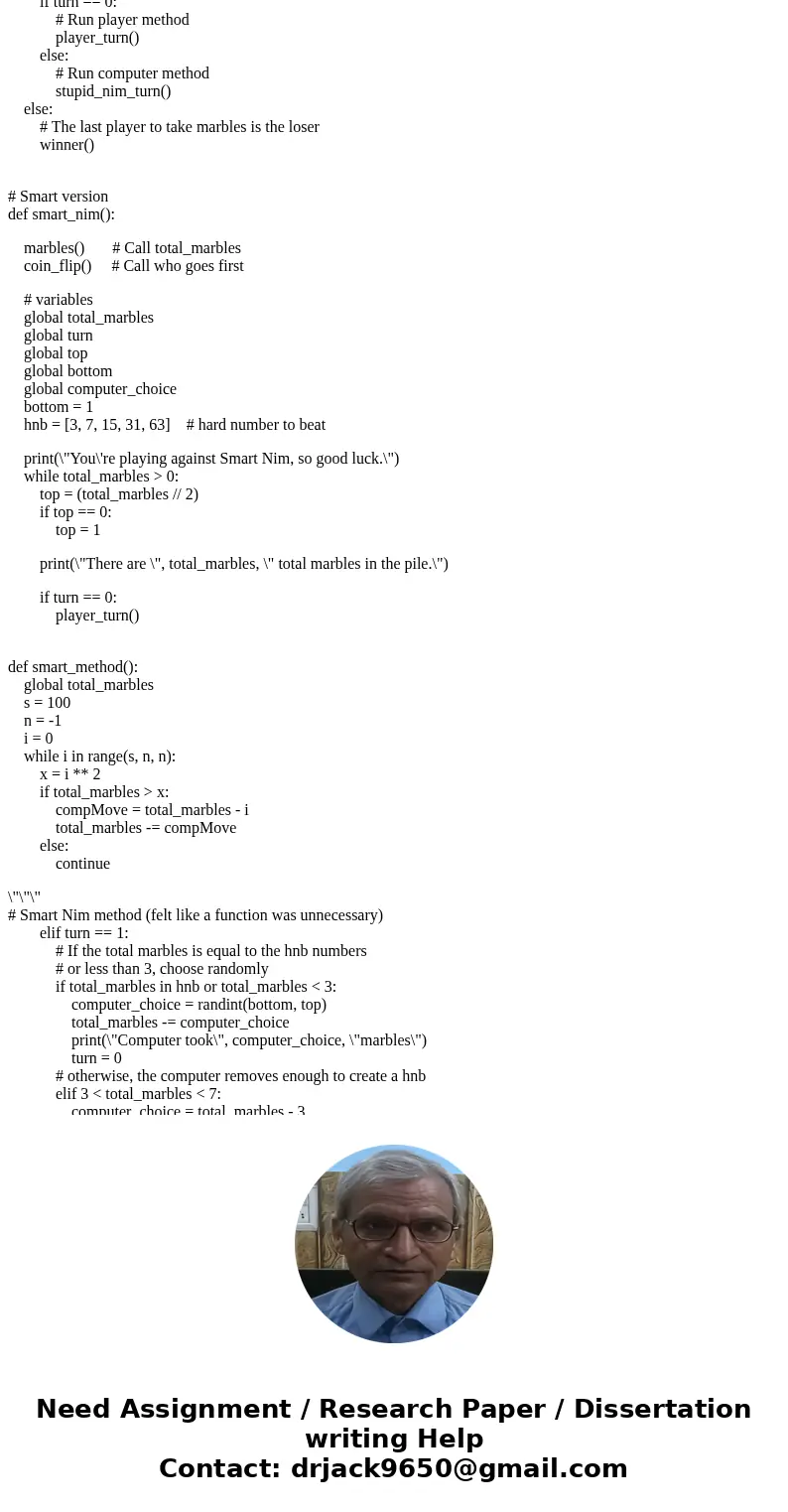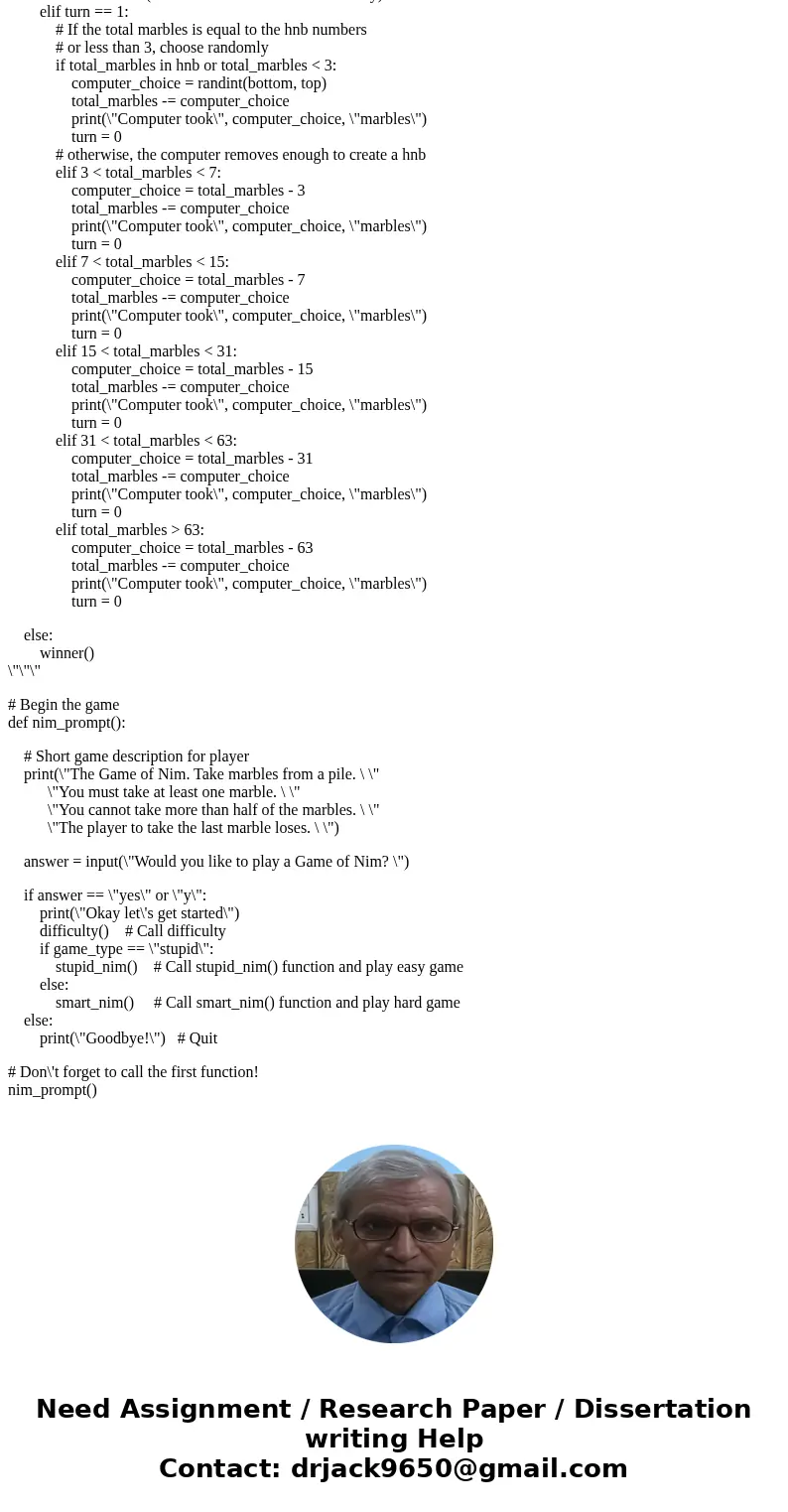The game of Nim This is a wellknown game with a number of va
Solution
\"\"\"
The Game of Nim
Pile of marbles between 10-100.
Each player takes a chosen amount
of marbles from the pile.
Player must take at least one marble,
but no more than half of what is in the
pile.
Playing against the computer.
\"\"\"
from random import randint
pi = 3.14
# Difficulty generator to decide game_type
def difficulty():
global game_type
goo = randint(0, 1)
if goo == 0:
game_type = \"smart\"
else:
game_type = \"stupid\"
# Coin flip to decide who goes first
def coin_flip():
global turn
turn = randint(0, 1)
# Generate an initial number of marbles for the pile
def marbles():
global total_marbles
total_marbles = randint(10, 100)
# Winner function
def winner():
global turn
if turn == 0:
print(\"You Win! :D\")
else:
print(\"The computer beat you. :(\")
# Human player turn function
def player_turn():
# Variables
global player_choice
global top
global total_marbles
global turn
print(\"You can take up to\", top, \"marbles\")
player_choice = int(input(\"How many marbles would you like to take? \"))
# Players choice must be between 1 and half of the total_marbles.
while 0 < player_choice > top:
print(\"You can\'t take that many marbles.\")
player_choice = int(input(\"How many marbles would you like to take? \"))
else:
total_marbles -= player_choice
turn = 1
# Stupid computer turn
def stupid_nim_turn():
global computer_choice
global bottom
global top
global total_marbles
global turn
bottom = 1
computer_choice = randint(bottom, top)
total_marbles -= computer_choice
print(\"Computer took\", computer_choice, \"marbles\")
turn = 0
# Stupid version of game
def stupid_nim():
marbles() # Call total_marbles
coin_flip() # Call who goes first
# variables
global total_marbles
global turn
global bottom
global player_choice
global top
bottom = 1
print(\"You\'re playing against Stupid Nim, so have fun\")
while total_marbles > 0:
# declare top inside while statement
# or top will no change from the first value
top = (total_marbles // 2)
# 1//2 = 0
# gets stuck because you cant take marbles
if top == 0:
top = 1
print(\"There are \", total_marbles, \" total marbles in the pile.\")
if turn == 0:
# Run player method
player_turn()
else:
# Run computer method
stupid_nim_turn()
else:
# The last player to take marbles is the loser
winner()
# Smart version
def smart_nim():
marbles() # Call total_marbles
coin_flip() # Call who goes first
# variables
global total_marbles
global turn
global top
global bottom
global computer_choice
bottom = 1
hnb = [3, 7, 15, 31, 63] # hard number to beat
print(\"You\'re playing against Smart Nim, so good luck.\")
while total_marbles > 0:
top = (total_marbles // 2)
if top == 0:
top = 1
print(\"There are \", total_marbles, \" total marbles in the pile.\")
if turn == 0:
player_turn()
def smart_method():
global total_marbles
s = 100
n = -1
i = 0
while i in range(s, n, n):
x = i ** 2
if total_marbles > x:
compMove = total_marbles - i
total_marbles -= compMove
else:
continue
\"\"\"
# Smart Nim method (felt like a function was unnecessary)
elif turn == 1:
# If the total marbles is equal to the hnb numbers
# or less than 3, choose randomly
if total_marbles in hnb or total_marbles < 3:
computer_choice = randint(bottom, top)
total_marbles -= computer_choice
print(\"Computer took\", computer_choice, \"marbles\")
turn = 0
# otherwise, the computer removes enough to create a hnb
elif 3 < total_marbles < 7:
computer_choice = total_marbles - 3
total_marbles -= computer_choice
print(\"Computer took\", computer_choice, \"marbles\")
turn = 0
elif 7 < total_marbles < 15:
computer_choice = total_marbles - 7
total_marbles -= computer_choice
print(\"Computer took\", computer_choice, \"marbles\")
turn = 0
elif 15 < total_marbles < 31:
computer_choice = total_marbles - 15
total_marbles -= computer_choice
print(\"Computer took\", computer_choice, \"marbles\")
turn = 0
elif 31 < total_marbles < 63:
computer_choice = total_marbles - 31
total_marbles -= computer_choice
print(\"Computer took\", computer_choice, \"marbles\")
turn = 0
elif total_marbles > 63:
computer_choice = total_marbles - 63
total_marbles -= computer_choice
print(\"Computer took\", computer_choice, \"marbles\")
turn = 0
else:
winner()
\"\"\"
# Begin the game
def nim_prompt():
# Short game description for player
print(\"The Game of Nim. Take marbles from a pile. \ \"
\"You must take at least one marble. \ \"
\"You cannot take more than half of the marbles. \ \"
\"The player to take the last marble loses. \ \")
answer = input(\"Would you like to play a Game of Nim? \")
if answer == \"yes\" or \"y\":
print(\"Okay let\'s get started\")
difficulty() # Call difficulty
if game_type == \"stupid\":
stupid_nim() # Call stupid_nim() function and play easy game
else:
smart_nim() # Call smart_nim() function and play hard game
else:
print(\"Goodbye!\") # Quit
# Don\'t forget to call the first function!
nim_prompt()




 Homework Sourse
Homework Sourse